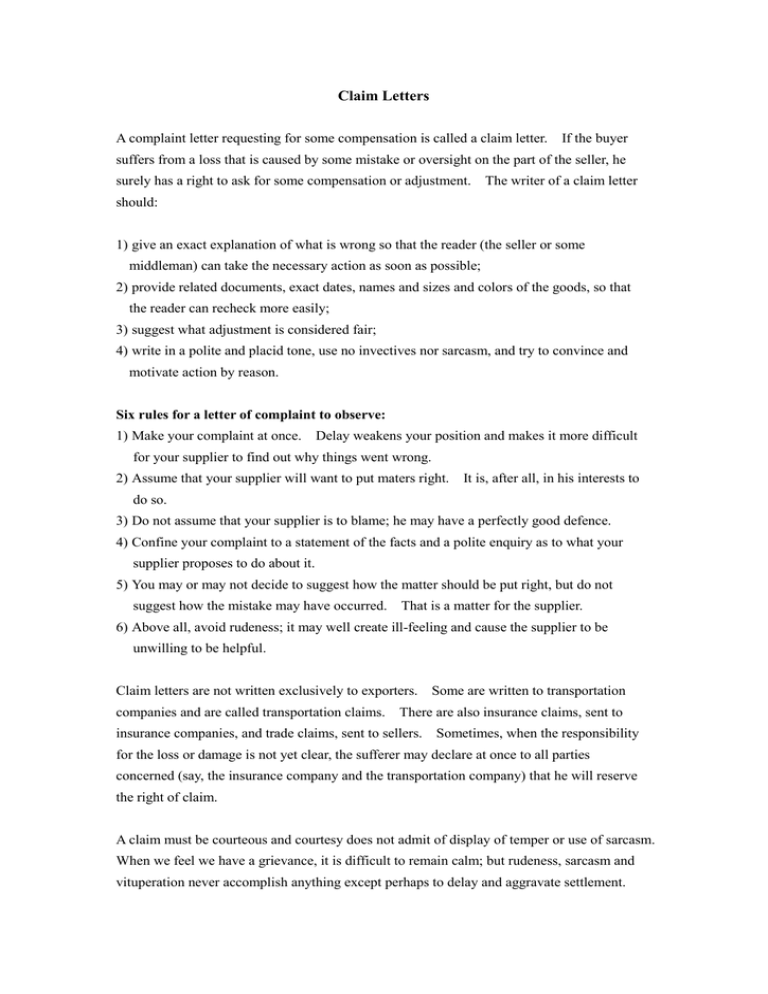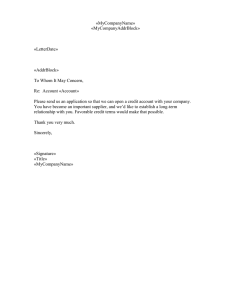Claim Letters
advertisement

Claim Letters A complaint letter requesting for some compensation is called a claim letter. If the buyer suffers from a loss that is caused by some mistake or oversight on the part of the seller, he surely has a right to ask for some compensation or adjustment. The writer of a claim letter should: 1) give an exact explanation of what is wrong so that the reader (the seller or some middleman) can take the necessary action as soon as possible; 2) provide related documents, exact dates, names and sizes and colors of the goods, so that the reader can recheck more easily; 3) suggest what adjustment is considered fair; 4) write in a polite and placid tone, use no invectives nor sarcasm, and try to convince and motivate action by reason. Six rules for a letter of complaint to observe: 1) Make your complaint at once. Delay weakens your position and makes it more difficult for your supplier to find out why things went wrong. 2) Assume that your supplier will want to put maters right. It is, after all, in his interests to do so. 3) Do not assume that your supplier is to blame; he may have a perfectly good defence. 4) Confine your complaint to a statement of the facts and a polite enquiry as to what your supplier proposes to do about it. 5) You may or may not decide to suggest how the matter should be put right, but do not suggest how the mistake may have occurred. That is a matter for the supplier. 6) Above all, avoid rudeness; it may well create ill-feeling and cause the supplier to be unwilling to be helpful. Claim letters are not written exclusively to exporters. Some are written to transportation companies and are called transportation claims. There are also insurance claims, sent to insurance companies, and trade claims, sent to sellers. Sometimes, when the responsibility for the loss or damage is not yet clear, the sufferer may declare at once to all parties concerned (say, the insurance company and the transportation company) that he will reserve the right of claim. A claim must be courteous and courtesy does not admit of display of temper or use of sarcasm. When we feel we have a grievance, it is difficult to remain calm; but rudeness, sarcasm and vituperation never accomplish anything except perhaps to delay and aggravate settlement. Example: Gentlemen: We regret very much to inform you that the State Authorities on Food and Drug Inspections have discovered and rejected approximately one ton of bad fish from the consignment of Frozen Tuna shipped by the M.S. “President Wilson” on November 28, 1992 under your Invoice No. A892-1. We are confident that you will take extreme care to ship prime quality fish, so that in the forthcoming transactions we may avoid the loss and difficulties that may arise from the rejections. The total amount of rejection as shown in the enclosed Claim sheet and Certificate of BFDI is $364.08. We would appreciate your sending us a check in U.S. Dollars covering the claim. Yours very sincerely Enclosure 1: Claim for rejected fish December 20, 1992 CLAIMS FOR REJECTED FISH From the First Consignment Ex Steamer “President Wilson” Arrived December 12, 1992 Invoice No. A892-1 Supplier: ABC Ltd. Keelung, Taiwan Rejectors: Raw………………. 1590 lbs Cooked……….210 × 3 630 lbs Total……………… 2220 lbs Costs: CIF Astoria ………… $320.00 Wfge & Hdlg ……….. 1.30 Barge …………….. 2.00 Brokge, Clnce …….. 2.00 Weigh, Icing, etc. ……. 2.60 $ 328.00 × 1.11 tons = $364.08 Columbia Packers. Inc. Signed Claim Dept.



